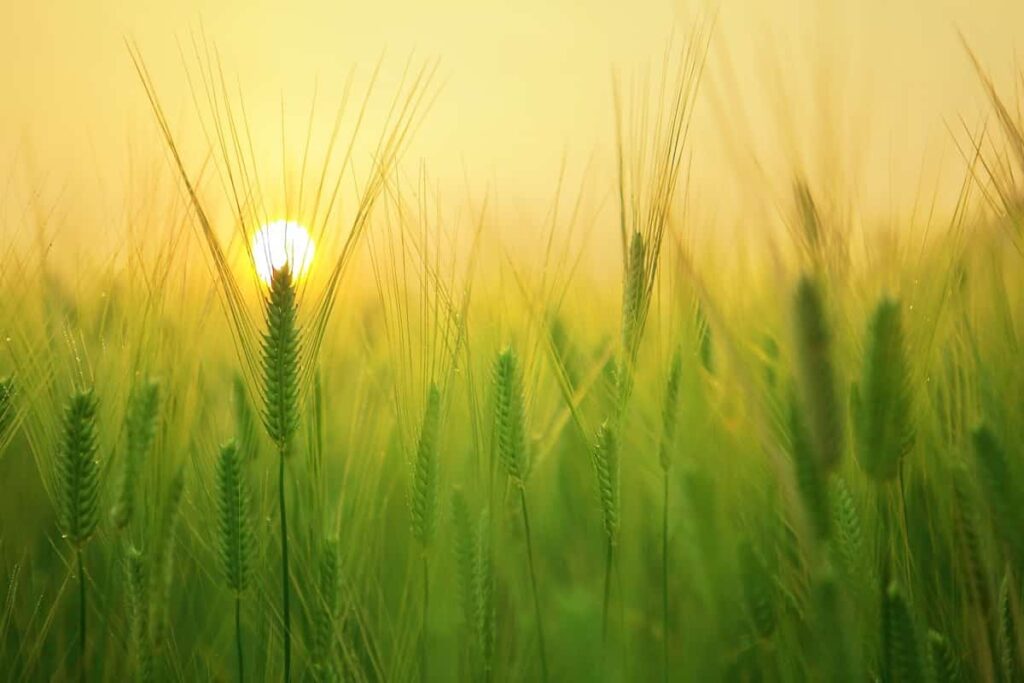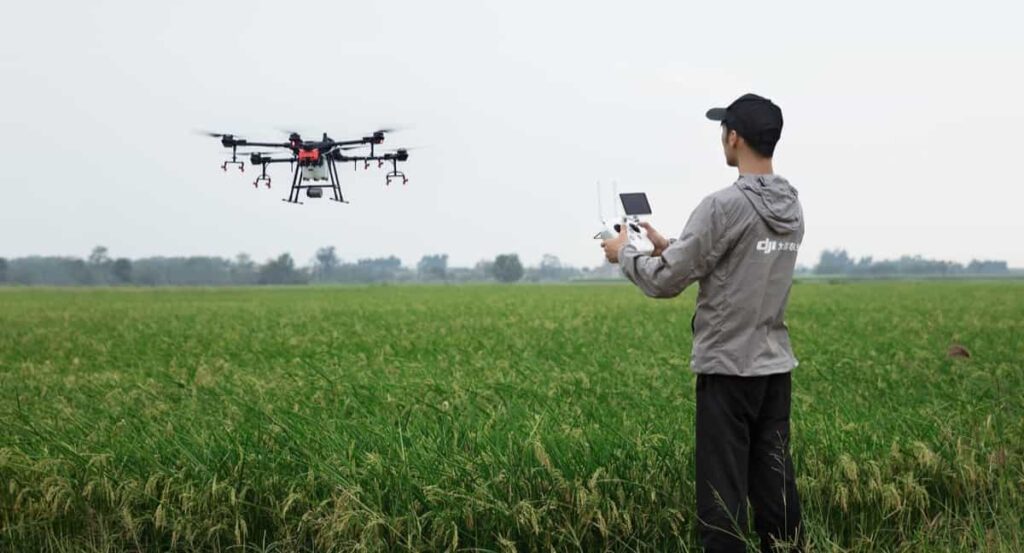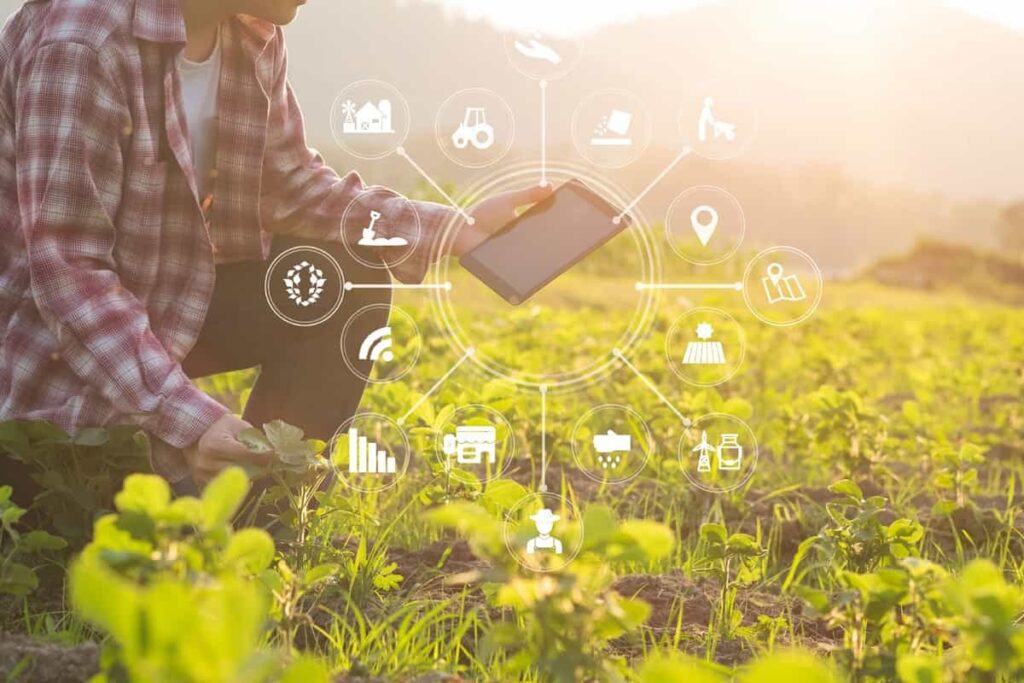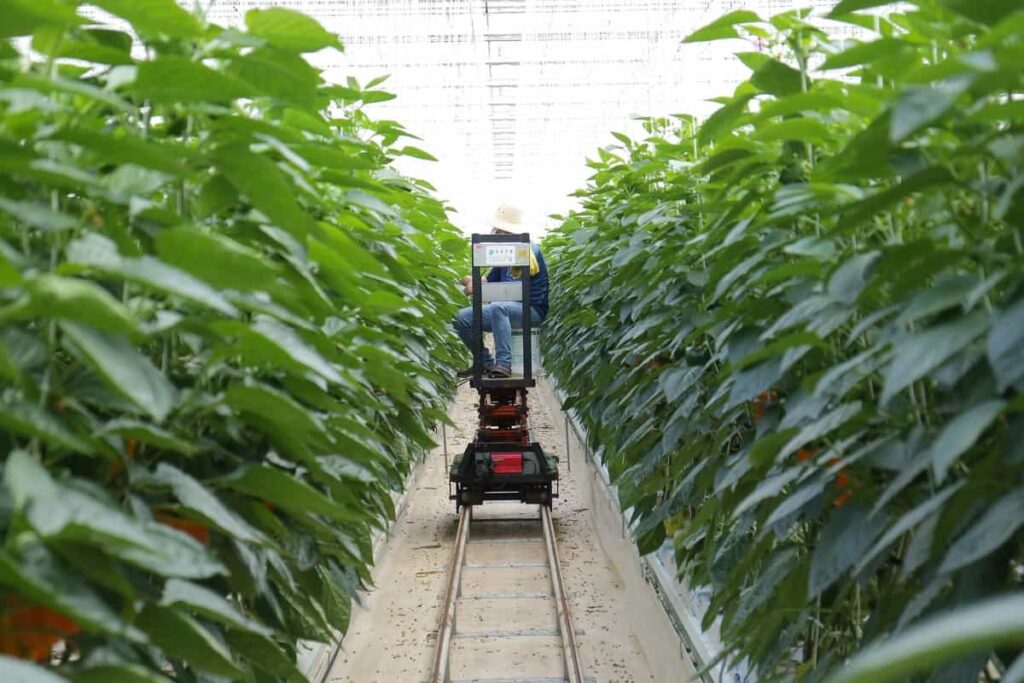Agriculture is an industry that is ripe for change and innovation. With the advent of this technology, there is now a way to revolutionize how we farm and distribute food. Blockchain technology can trace food from farm to table, ensuring it is safe and high-quality. It can also create a more efficient supply chain, reducing waste and ensuring that farmers get fair product prices.

In this article, we will explore the potential of blockchain technology in agriculture. We will discuss how it can trace food, create a more efficient supply chain, and help small farmers get fair product prices.
Blockchain technology in agriculture
What is blockchain technology?
In its simplest form, blockchain is a digital ledger of transactions. When applied to agriculture, it can track where food comes from, identify inefficiencies and waste areas, and even help ensure food safety. The potential applications of blockchain technology in agriculture are nearly limitless. Some of the ways it could be used include:
- Tracking the origin of food items from farm to table
- Monitoring the freshness of food items throughout the supply chain
- Detecting fraud and traceability issues in the food system
- Improving farmer payments and reducing transaction costs
- Eliminating middlemen and other intermediaries in the agricultural supply chain
- Reducing wastage throughout the agricultural value chain
How could blockchain technology be used in agriculture?
The use of blockchain technology in agriculture has the potential to transform the sector by increasing transparency, traceability, and efficiency. Blockchain allows for transparent, secure, and tamper-proof record-keeping. This makes it well-suited for tracking the provenance of food products from farm to table. For example, Walmart is piloting a blockchain-based system for tracing the origins of pork in China.
The aim is to increase food safety by providing a complete picture of the supply chain and ensuring that products are sourced from approved suppliers. In addition to tracking provenance, blockchain can be used for other purposes, such as crop insurance and supply chain management. For example, IBM is working with several companies on a blockchain platform that will help manage the global supply chain of coffee.
In case you missed it: 12 Best Agriculture Business Ideas in the USA: A Beginners Guide for Making Profits

The system will track coffee beans from growers to roasters and provide real-time visibility into the entire process. This will allow for better coordination between different actors in the supply chain and ultimately lead to a more efficient and sustainable sector. Overall, blockchain technology has the potential to transform agriculture by making it more transparent, efficient, and sustainable.
The pros and cons of blockchain in agriculture
There is no one-size-fits-all answer to the agriculture question of whether or not blockchain technology is a good fit for agriculture. Every agricultural operation is different, with its own unique set of challenges and opportunities. That said, some general pros and cons of using blockchain in agriculture are worth considering.
Pros
1. Increased Traceability: One of the main advantages of using blockchain in agriculture is its increased traceability. Blockchain allows each step in the supply chain to be tracked and recorded, making it easier to identify issues and track products from farm to table. This is particularly valuable for food safety and quality control.
2. Improved Efficiency: Blockchain can also help streamline processes and improve efficiency across the agricultural supply chain. For example, smart contracts can automate certain transactions, such as payments for crops delivered to a buyer. This can help save time and reduce costs.
3. Greater Transparency: Another benefit of using blockchain in agriculture is greater transparency throughout the supply chain. With all data stored on a shared ledger, everyone involved in a transaction can access the same information. This can help build trust between buyers and sellers and create more transparent business practices.
4. Enhanced Security: Blockchain technology offers enhanced security for agricultural data. Because data on a blockchain is immutable, it cannot be tampered with or deleted. This provides a high level of protection for sensitive information, such as contract terms
Cons
The potential for blockchain technology to revolutionize the agricultural industry is undeniable. However, several potential drawbacks should be considered before implementing this technology on a large scale. One of the biggest concerns is the cost of implementing and maintaining a blockchain system. Agricultural businesses often operate on tight margins, so additional costs could make it difficult for them to compete.
Another worry is that the decentralized nature of blockchain could make it more difficult to regulate. This could lead to problems with food safety, as it would be harder to track where products came from and ensure that they meet all safety standards. Finally, there is the possibility that blockchain technology could exacerbate the existing problems with concentrated animal feedlots. These operations already have difficulty tracking their animals, and adding blockchain into the mix could make it even more complicated.
In case you missed it: Agricultural Business Plan: How to Start, and Profitable Ideas

Case studies of blockchain in agriculture
The use of blockchain technology in agriculture is still in its early stages, but several case studies already show the potential for this innovative technology. One example is the Provenance project, which uses blockchain to trace the origins of fish. The project has partnered with several seafood suppliers, and a record is added to the blockchain each time a fish is caught.
This allows consumers to see where their fish comes from and provides valuable data for scientists and conservationists. Another interesting example is the Ethereum-based Grameen Foundation project, which is working to empower small-scale farmers in developing countries. The project uses smart contracts to help farmers access loans and other financial services.
Using blockchain, the Grameen Foundation can ensure that these loans are repaid and that farmers receive the full benefit of these financial services. These are just two examples of how blockchain technology can be used in agriculture. As more projects emerge, it is becoming clear that blockchain has the potential to transform the way we produce and consume food.
Future of blockchain technology in agriculture
There is no doubt that this technology has the potential to revolutionize the agricultural industry. By providing a secure, decentralized platform for tracking data and transactions, blockchain could help farmers reduce costs, improve traceability, and increase transparency throughout the supply chain. However, it is still in its infancy, and many challenges must be addressed before the agricultural industry can widely adopt it.
The biggest challenges are scalability; currently, most blockchain platforms can handle a limited number of transactions per second. This means they cannot keep up with the high volume of data generated by the agricultural sector. Another challenge facing blockchain technology is regulatory uncertainty. Because blockchain platforms are often used for illegal activities like money laundering and drug trafficking, governments worldwide are still trying to figure out how to regulate them.
This regulatory uncertainty could make it difficult for blockchain platforms to gain traction in the agricultural industry. Despite these challenges, there is reason to be optimistic about blockchain technology in agriculture in the future. With continued research and development, it is possible that these challenges will be overcome and that blockchain will become a transformative force in agriculture.
Blockchain in agriculture supply chain
Blockchain technology can help to create a more transparent and efficient agriculture supply chain. By tracking the provenance of food items from farm to table, blockchain can help to improve food safety and traceability. In addition, blockchain-based smart contracts can automate various aspects of the agricultural supply chain, such as payments and logistics.
In case you missed it: Agriculture in Uganda: Types, Importance, Crops, and Statistics

The potential benefits of blockchain technology in agriculture are vast. However, some challenges must be addressed before blockchain can be adopted in the agricultural sector. For instance, many small farmers may not have access to blockchain technology or resources. Additionally, it will be important to ensure that data stored on the blockchain is accurate and tamper-proof.
Despite these challenges, blockchain technology can potentially transform the agricultural industry for the better. With its ability to improve transparency, efficiency, and traceability throughout the supply chain, blockchain could play a vital role in ensuring that our food system is safe and sustainable.
Can blockchain technology support agricultural sustainability?
Applying blockchain technology in the agricultural sector can create new opportunities for farmers and other stakeholders to increase transparency, reduce costs, and improve efficiencies. When applied to supply chain management, blockchain can help to ensure that products are traced back to their source, preventing fraud and improving food safety. In addition, by providing a secure and decentralized platform for data sharing, blockchain can help farmers to access new markets and sell their products directly to consumers.
For blockchain technology to truly support agricultural sustainability, however, farmers must be able to benefit from its use. Otherwise, there is a risk that the technology will reinforce existing power structures and exacerbate inequality. To ensure that farmers can take the opportunities offered by blockchain technology, they must be included in the development and implementation process from the outset. Furthermore, policy measures may be needed to create an enabling environment for using blockchain in agriculture.
How is blockchain used in renewable energy in agriculture?
The use of blockchain technology in agriculture is still in its early stages, but several potential applications could significantly impact the sector. One area where blockchain could be particularly useful in tracking renewable energy credits (RECs). RECs represent the environmental attributes of a unit of electricity generated from a renewable source. They can be bought and sold to offset greenhouse gas emissions from non-renewable sources.
At present, the REC market is relatively small and fragmented. There is no central registry of RECs, and manually tracking them is time-consuming and prone to error. This makes it difficult for buyers to get what they pay for and sellers to get fair prices for their RECs. Blockchain could solve these problems by creating a decentralized registry of RECs. This would make it much easier for buyers and sellers to find each other and trade RECs without intermediaries.
It would also make it possible to automate the process of tracking RECs, making it more efficient and accurate. In addition, to tracking RECs, blockchain could also be used to track other environmental data such as carbon offsets. This would enable companies and individuals to offset their emissions more transparently and efficiently. The potential applications of blockchain technology in agriculture are still being explored, but there is already a lot of excitement about its potential
Agriculture blockchain startups
This is a distributed ledger technology that has the potential to revolutionize the agriculture industry. Agricultural supply chains are complex and often involve multiple stakeholders, making them ripe for disruption by blockchain technology. Several startups are working on applications of blockchain technology in agriculture, and many focus on traceability. By tracking items on the blockchain, businesses and consumers can be sure of the provenance of their food products.
In case you missed it: Powering Agriculture with Renewable Energy in India: How to Achieve, and Sustainable Benefits

This is particularly important in food safety, as it can help identify and isolate contaminated products quickly. Some startups are also working on using blockchain to create new marketplaces for agricultural products. These platforms could provide farmers with direct access to buyers, cutting out middlemen and increasing transparency in the pricing of agricultural goods. Other startups are using blockchain to develop new financing models for farmers.
For example, one startup is working on a platform allowing farmers to tokenize their harvests and sell them as securities to investors. This would provide farmers with much-needed capital upfront while giving investors a stake in future production. Blockchain technology is still early but holds great promise for the agriculture industry. These startups are just a few examples of the innovative ways blockchain is used to solve agriculture problems.
Blockchain technology in agriculture in India
The Indian government is looking to harness the power of blockchain technology to streamline the country’s agricultural sector. The government believes that blockchain can increase transparency and traceability in the supply chain, leading to better farmers’ prices and a more efficient system overall. The government is working with several startups and companies already using blockchain in their businesses to implement this initiative.
These organizations will help develop pilot programs that will test the feasibility of using blockchain in various aspects of the agricultural sector. If these pilot programs are successful, then it is likely that blockchain will be adopted on a larger scale in India’s agricultural sector. There are many benefits of using blockchain in agriculture. For example, it could help to reduce corruption and fraud, as all transactions would be recorded on a tamper-proof public ledger.
Additionally, it could help to increase efficiency by reducing the need for paper records. Blockchain could also help farmers to get better prices for their products by cutting out middlemen and increasing transparency throughout the supply chain. Overall, the Indian government is hopeful that blockchain technology can help to modernize the country’s agricultural sector and make it more efficient and transparent. This could be a major breakthrough for blockchain adoption in India and globally.
Which state in India has introduced blockchain technology in agriculture?
In India, Jharkhand is the first state to distribute seeds using blockchain technology. The state of Maharashtra in India has introduced blockchain technology in agriculture. This is a major initiative that could potentially help the country’s farmers become more efficient and productive.
The project is run by the National Informatics Centre (NIC) and uses blockchain to create a distributed ledger tracking agricultural produce. This will allow for better transparency and traceability of crops and provide farmers with more data to make informed decisions about their crops. This is still in its early stages, but if successful, it could be rolled out to other states in India and beyond.
Blockchain technology in aquaculture
The use of blockchain technology in aquaculture has the potential to revolutionize the sector. By creating a decentralized and tamper-proof record of transactions, blockchain could help improve traceability and transparency in the aquaculture supply chain. This would enable consumers to make informed choices about the fish they purchase and could help to ensure that seafood is sourced from sustainable and ethical operations.
In addition, blockchain could track fish movement throughout the supply chain, from farm to table. This would help to reduce food waste and ensure that fish is properly labeled and safe to eat. The use of blockchain in aquaculture is still in its early stages, but several startups are working on applications for the sector. And with the increasing interest in blockchain technology, we will likely see more innovations in this area in the future.
How is the blockchain changing the agricultural supply chain?
It is a distributed ledger technology that enables secure, transparent and tamper-proof record-keeping. This makes it well-suited for tracking the provenance of agricultural products. Blockchain can be used to trace the journey of food from farm to table, ensuring that it has been produced safely and sustainably.
It can also track the movement of livestock and other animals and agricultural inputs such as seeds and water. This information can enhance food safety, improve supply chain efficiency and build trust between producers and consumers. In the future, blockchain may also help small farmers gain greater visibility in the global food system.
In case you missed it: Plant Nursery Business Plan in India: Startup Costs, Profit, License, and Taxes

What are the 4 components of a blockchain ecosystem?
- A blockchain platform is the foundation of a blockchain ecosystem. It is a decentralized, distributed ledger that enables trustless collaboration and verifies data sharing across a network of computers.
- A blockchain application is built on top of a blockchain platform and allows users to interact with the underlying ledger data.
- A blockchain network consists of the nodes that run the blockchain platform and applications.
- A blockchain community comprises the developers, enterprises, and individuals that use, build, or invest in blockchain technology.
Conclusion
The potential for blockchain technology in agriculture is vast. From increasing transparency and traceability to reducing fraudulent activities, there are many ways that blockchain could help to improve the agricultural industry. We hope this information has given you a better understanding of blockchain and its potential applications in agriculture. If you’re interested in learning more information about this technology, we recommend checking out our other articles on the subject.
- Sheep Farming Business Plan for Beginners
- Aquaponic Farming at Home: A Step-By-Step Guide
- Profitable Village Farming Business Ideas in 2024
- High-Yield Aquaculture: Fast-Growing Fish for Farming
- Effective Fish Pond Construction Techniques for Beginners
- Irrigation and Water Management in Pineapple Farming
- Blossom to Harvest: Mastering Flowering and Pollination in Papaya Farming
- Pig Fattening Essentials: From Selection to Sale for Beginners
- Raising Wagyu Cattle: A Complete Guide for Premium Beef Production
- Soil Types and Their Water Holding Capacity
- Optimizing Irrigation Schedules for Coconut Groves for Enhanced Yield
- Espresso Your Garden: Coffee Grounds for Healthier Acid-Loving Plants
- The Best Soil Mix for Snake Plants: How to Mix Your Own Snake Plant Soil
- Green Thumb Success: Expert Tips for Cultivating Greenhouse Beans All Year Round
- Bloom All Year Round: The Ultimate Guide to Indoor Hyacinth Care
- Eco-Friendly Gardening: How to Make Liquid Fertilizer from Kitchen Waste
- Ultimate Guide to Grow Anise in Pots: Explore Seed Propagation to Harvesting
- Guide to Raising Chester White Pigs: Discover Breed Facts to Growth Management
- Mastering the Elegance: The Ultimate Guide to Weeping Cherry Tree Care, Planting, and Maintenance
- Ultimate Guide to Planting Garlic in Grow Bags: Growing Strategies for Beginners
- How to Fix Spider Plant Leaf-Related Problems: Natural and Organic Remedies
- 10 Reasons Why Your Tulsi Plant is Shedding Leaves: Home Remedies and Solutions
- Optimizing Growth and Yield: The Advantages of Palm Bunch Ash Fertilizer
- Utilizing Neem Oil Extract as a Natural Pesticide for Hydrangea
- From Soil to Harvest: Various Ways in Which Farmers Can Use AI Tools
- Steps to Encourage and Induce Citrus Flowers: A Comprehensive Guide
- How to Fix Snake Plant Leaf-Related Issues: Natural and Organic Remedies
- Transform Your Garden into a Fragrant Oasis with Raat Ki Rani (Night Blooming Jasmine)
- Discover the Ideal Chicken Breeds for Philippine Farms
- How to Create a Poultry Egg Farm Business Plan for Profits
- Grow Lemon Cucumbers Like a Pro: Insider Techniques for Bountiful Yields
- Ultimate Guide to Caring for Your Pink Princess Philodendron: Tips for Thriving Variegation
- Areca Nut Profit Per Acre: Calculating Yield and Cost of Cultivation
- How Kaveri Chicken is Becoming a More Profitable Breed in Indian Backyards
- Transform Your Barn: 9 Steps to Convert a Horse Stall into a Chicken Coop
- Exploring Suffolk Sheep Disadvantages with Limitations and Challenges
